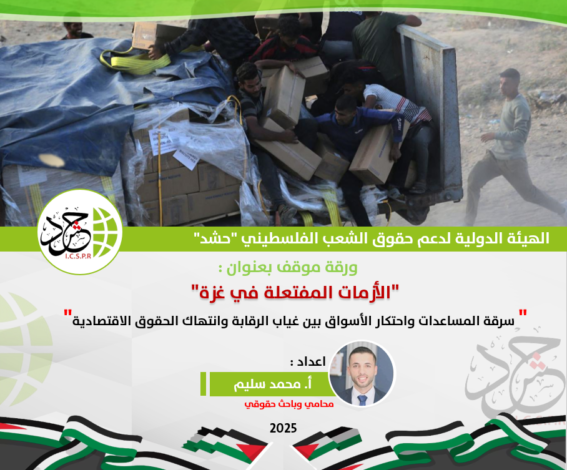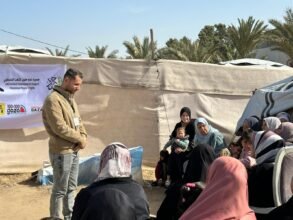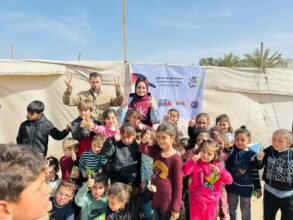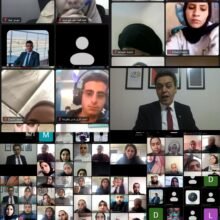
ICSPR Issues a Position Paper on the Manufactured Crises in Gaza: Aid Theft and Market Monopolies Amid Lack of Oversight and Violations of Economic Rights
Date: May 25, 2025
Press Release
ICSPR Issues a Position Paper on the Manufactured Crises in Gaza: Aid Theft and Market Monopolies Amid Lack of Oversight and Violations of Economic Rights
The International Commission to Support Palestinian Rights (ICSPR) has released a new position paper authored by researcher Mohammed Asleem, titled: “Manufactured Crises in Gaza: Aid Theft and Market Monopolies Amid Lack of Oversight and Violations of Economic Rights.” The paper sheds light on the deteriorating economic and living conditions in the Gaza Strip, amid the ongoing occupation, absence of official oversight, market monopolies, and the spread of corruption factors that have led to grave violations of the population’s economic and social rights.
The Paper Highlights Unprecedented Economic Deterioration in Gaza
The paper notes that Gaza is experiencing one of its worst economic crises, with widespread manifestations of extreme poverty and an unemployment rate exceeding 47% among the labor force, while the poverty rate surpasses 64%, according to recent estimates.
These figures, the paper explains, reflect the failure of the governing authorities to provide real solutions, amid growing accusations of manufacturing crises in the markets through monopolizing essential goods and deliberately obstructing the delivery of humanitarian aid, thereby increasing the burden on citizens.
Lack of Government Oversight and Market Monopolization
The paper clarifies that the absence of serious market oversight in Gaza has enabled major merchants to exploit the situation by unjustifiably raising prices and monopolizing goods especially those arriving as aid and redirecting them to the commercial market instead of distributing them to those in need.
Researcher Mohammed Asleem confirmed that these practices are sometimes carried out with the cover of influential parties, undermining any efforts to regulate the market or protect consumers. He pointed out that some entities involved in aid distribution are subject to the authority of the Gaza government, which hinders transparency and accountability.
Aid Is Stolen and Sold in Markets Instead of Being Distributed
The paper highlights that a significant portion of aid entering Gaza through the crossings is being diverted to the black market and resold at high prices, depriving the targeted beneficiaries of their rightful share. It cites testimonies from citizens who received incomplete food parcels or were not reached despite being registered with donor organizations.
The paper also notes that such conduct violates international human rights standards, particularly the International Covenant on Economic, Social and Cultural Rights, and constitutes both an economic and ethical crime amid the humanitarian catastrophe suffered by the population besieged for over 17 years.
The Occupation Facilitates Aid Theft and Targets Protection Committees
The Commission documented the Israeli occupation forces’ targeting of security personnel and civilians who were safeguarding humanitarian aid trucks along Salah Al-Din Road, between the Ramzoun area and Al-Mazra’a School south of Deir al-Balah in central Gaza. This attack resulted in the death and injury of several individuals, while the occupation turned a blind eye to armed looters.
The incident occurred at approximately 22:40 on Thursday, May 22, 2025, when an armed gang of around 15 individuals ambushed aid trucks at the southern entrance of Deir al-Balah. They used garbage trucks to block the road and fired heavily in an attempt to loot the aid-laden vehicles. When security personnel and protection committees intervened, they were surprised by Israeli helicopters and drones that directly fired missiles at them, killing or injuring several members instantly.
This incident, among others, reveals the occupation’s efforts to facilitate aid theft by ignoring armed looters while simultaneously targeting protection committees, as part of creating conditions for a new mechanism for aid distribution. This mechanism involves private companies distributing aid in selected areas, primarily Rafah, under direct Israeli supervision. It represents a deliberate attempt to manage hunger and push the population toward specific zones in preparation for forced displacement plans.
In addition to the lack of local protection, the Israeli authorities bear direct responsibility for this crisis through systematic strategies aimed at transforming humanitarian aid into a tool for redesigning the population distribution in Gaza. There have been documented cases of aid shipments being seized by Israeli authorities at the crossings and held for days or weeks, depriving thousands of families of essential needs.
Israel has also sought to privatize aid distribution by contracting Israeli companies to manage distribution centers in southern Gaza, believed to be part of the “Five Fingers Plan,” aimed at fragmenting the Gaza Strip and undermining efforts to rebuild the Palestinian national structure.
According to reports by human rights organizations, including Human Rights Watch, this form of control constitutes a forced reshaping of the economic and demographic landscape—amounting to a war crime and possibly genocide by starvation.
Practices That Violate the Economic Rights of Gazans
The paper stresses that manufactured crises and goods monopolization are not merely economic issues but constitute violations of fundamental human rights. They affect the right to food, dignity, and social justice. The prevailing collusion or silence of local authorities worsens the situation, erodes public trust in institutions, and reinforces a climate of corruption and impunity.
Call for Oversight, Accountability, and Legal Action
The paper calls on ICSPR and the international community to act urgently to:
-
Conduct transparent investigations into cases of aid theft and market monopoly.
-
Hold accountable those responsible for aid theft, including individuals within institutions and complicit merchants.
-
Strengthen both popular and official oversight over the movement of goods and aid.
-
Launch awareness campaigns against economic corruption and in defense of the economic rights of marginalized groups.
-
Pressure for the permanent opening of crossings and the facilitation of aid delivery under fair international supervision.
-
Activate the role of local and international monitoring bodies in overseeing aid distribution.
The International Commission “ICSPR” concluded the paper by stating that the continuation of these unjust economic policies would only worsen the humanitarian crisis in Gaza. The Commission urged the Palestinian Authority and the de facto government in Gaza to fulfill their legal and moral responsibilities toward the population by ensuring an economic environment based on justice and transparency that upholds the dignity of the Palestinian people.





